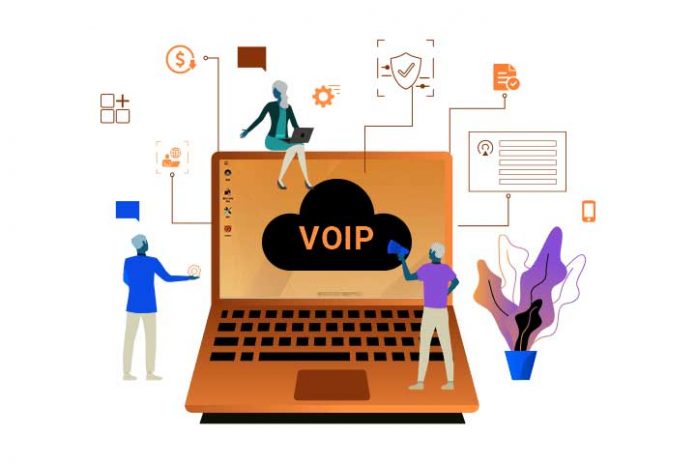Still don’t know what VoIP is ? Do you still manage calls in your company with a conventional telephone switchboard? Do you know how many business opportunities you are missing by depending on a device limited to your company’s facilities? Do you think it’s okay that your active and potential customers should take advantage of the working hours of an operator so that their calls are answered? Do you want to continue restricting the mobility of your collaborators?
Certainly, advances in information technology and the Internet multiplied the communication options between organizations and their customers and suppliers. Notwithstanding this, telephone calls continue to be one of the most used interaction channels in this field.
In this sense, virtual switchboards and applications based on voice over Internet protocol or VoIP are the solution for companies that want to maintain telephony as a means of contact; but integrating other functionalities that enrich the exchange.
What is VoIP?
In essence, VoIP is the technology that allows voice to be converted into data packets that can be exchanged over the Internet. So that the interaction can occur indistinctly between computers and mobile devices. Thanks to this resource, it is possible to add functions and services that conventional telephony does not support. For example, text chat or video calls through which several people can interact simultaneously.
VoIP calls are an alternative to conventional telephone communication , because they do not depend on the telephone cable or the signal from the antennas. But their quality does depend on the Internet coverage available.
The term VoIP is linked to the protocols that allow this type of communication, despite the fact that we usually limit it to calls. To carry out the same we can use any connection, be it through home LAN networks and even mobile data networks. In other words, you can call from your computer or from your mobile or tablet, if the available app allows it.
Applications such as Skype (Microsoft) and WhatsApp calls are some popular examples of VoIP use . So is One Net , a set of communication solutions from Vodafone , which brings together fixed and mobile voice on any device, through the same platform with switchboard functions in the cloud. To establish contact through these solutions, it is essential to have an Internet connection, preferably 4G or 5G .
VoIP: different but compatible with the landline
Although we normally use the technology at hand through mobile applications , it can also be used with landlines. Based on this, there are several options, and in all of them the voice sent by the phone is digitized and transmitted over the Internet. We will briefly highlight these alternatives:
VoIP routers , to which you can connect a conventional landline phone to call over the Internet.
Analog telephone adapter or VoIP ATA , which is a device connected to the router and which later allows the connection of several conventional telephones. It consists of a small piece of equipment that connects to the router, to which you can connect several conventional telephones, in order to channel calls through the network.
VoIP phones , very similar to common landlines, but that connect directly to the router. With them, you have the option of contracting a VoIP rate with your Internet provider.
As we said, you also have virtual switchboards , such as Vodafone’s One Net, which we will talk about later.
Advantages of VoIP telephony
Due to their characteristics, VoIP telephone systems provide a series of advantages for companies. Next, we will mention the most relevant.
Lower cost
As its name indicates, VoIP uses a broadband Internet connection to make and receive calls. This certainly eliminates the need for multiple traditional phone lines. In this way, organizations will obtain a considerable reduction in their operating costs.
Better quality calls
Voice over Internet Protocol systems provide HD quality audio that is much sharper and clearer. This condition is very evident if you have 4G or 5G coverage like the ones offered by Vodafone.
VoIP is flexible and scalable
Normally, VoIP resources are adaptable to the size, needs and characteristics of each company. In other words, it is feasible to configure and manage a voice over Internet protocol system tailored to your company. This will depend on the capacity of the available bandwidth, with which it would theoretically be possible to integrate hundreds of users.
On the other hand, VoIP is scalable because, by using the Internet to manage calls, it is very easy to add new users. In this aspect, telephone numbers and licenses are added, without requiring new lines. In other words, with VoIP you will be able to scale to meet the current and future requirements of your business.
Offers greater mobility
Today, mobility is key for a large number of organizations. After the health crisis caused by Covid-19, teleworking will continue to be a growing trend. Apart from that, many collaborators and commercials carry out their activities outside the physical offices of the companies. Thanks to the VoIP network , mobile and desktop users connect to your corporate phone system. Even through a virtual switchboard with this technology, you and the members of your team will answer customer calls on mobiles, wherever they are.
Reliability
Applications like Skype and WhatsApp have years of development and innovation. Hence, VoIP systems are secure and reliable technologies.
Avoid technological obsolescence
VoIP is the most advanced standard for telephone communication. ISDN technology (Integrated Services Digital Network, for its acronym in English) -which uses copper cable- is expected to be completely replaced in 2024. This is due to the advancement of fiber optic networks .
By replacing the old switchboard of your business with a virtual switchboard you will prevent your telephone communication system from falling into obsolescence.

